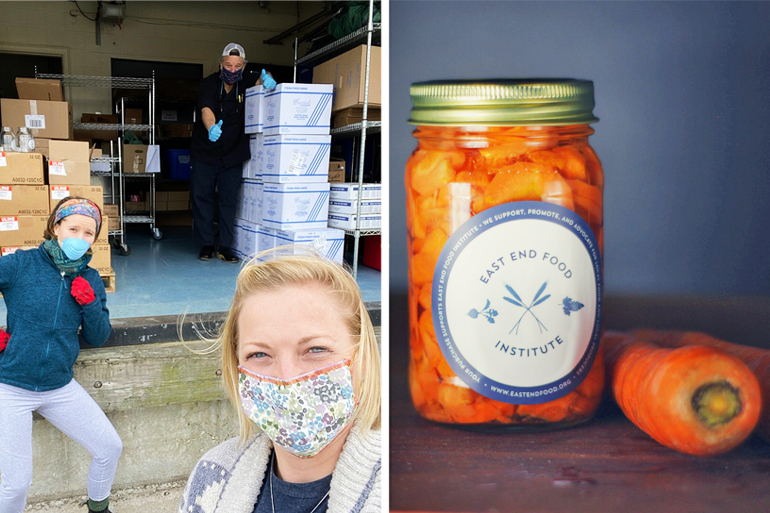East End Food Institute Offers Online Farmers Market, Aid to Local Farms

With farmers markets deemed essential in New York State, the East End Food Institute—a nonprofit that builds partnerships among local farmers, food producers and consumers—made the cautious decision to close the Riverhead Indoor Farmers Market anyway, paving the way for a new virtual shopping experience.
The Institute’s online farmers market offers snacks, desserts, beverages, pantry staples, dressings, condiments, and ready-to-go meals including various soups, quiche, vegetarian chili, pizza and more. There are even some non-food items available, such as hair products and pet treats, with new East End vendors, products and dishes added on a rolling basis. All online purchases are scheduled for delivery or pickup on Wednesdays and Fridays. The minimum order total is $50. Deliveries are free of charge and can be made to all locations in the five East End towns (East Hampton, Southampton, Riverhead, Southold and Shelter Island). Those picking up their purchased goods do so at the Stony Brook Southampton campus (39 Tuckahoe Road, Southampton) from noon–3 p.m.
We spoke with East End Food Institute Executive Director Kate Fullam about COVID-19’s impact on the organization, the new online farmers market and the current state of East End farms.
How has the COVID-19 pandemic affected the East End Food Institute?
During the COVID-19 crisis, food access and equity is clearly a hot topic. The food supply chain is essential, so we have remained open at our licensed commercial kitchen in Southampton with three staff members working on-site to sustain production and two remote from home. Local food products are being produced and distributed for home delivery, and to local markets, farms and food pantries. Our operations have remained consistent, but the main shift was an expansion of our safety protocols, which include wearing masks and gloves, increased hand-washing, and daily cleaning and sanitizing of high-touch surfaces. We’re keeping tuned in to the latest recommendations and adjusting as needed.
With farmers markets deemed essential, what drove the decision to close the Riverhead Indoor Farmers Market?
Although the guidance from the NYS Department of Agriculture and Markets recommends keeping farmers markets open, we made the decision to close the physical operations of Riverhead Indoor Farmers Market for the season, which would have been the end of April. Our top priority was and is to keep vendors and consumers safe and healthy, so an indoor market environment seemed risky. With the future uncertain, in mid-March we pivoted to put our efforts toward connecting vendors with new opportunities to sell their goods, including the creation of a new virtual farmers market with home delivery and pickup options out of our licensed commercial kitchen in Southampton.
Does the online farmers market feature the same vendors as the Riverhead Indoor Farmers Market, or is this something entirely new?
While the online store originated as an attempt by East End Food Institute to provide relief to vendors from the Riverhead Indoor Farmers Market, we have received requests from many vendors to be added to the store.
In addition to the online store, what are some ways the local community can support the East End Food Institute?
Most recently and urgently, East End Food Institute is expanding its Farm to Community program. We are partnering up with local food pantries to address the surge in demand for food as community members are in need of additional support. The program includes distribution of 1,600 meals weekly to patrons of Heart of the Hamptons food pantry in Southampton and Springs Food Pantry in East Hampton, and it costs about $10,000 per week. We are also sending prepared meals to the medical professionals at Stony Brook Southampton Hospital.
We have raised $50,000 to fund the first five weeks (April 22, 29, May 6, 13, 20), but we are seeking additional funds to sustain as long as is needed. When the program is no longer needed, any overage in funding will be dedicated to our established Farm to Community program, which involves freezing surplus local produce at the peak of freshness for food pantries and local institutions, such as hospitals and schools.
How has COVID-19 impacted East End farms and food producers?
The major impact I have seen on East End farms and food producers is having to shift their business model from wholesale high volume sales to retail pick-up and home delivery services. With social distancing in place, restaurants closed and many people hesitant to visit grocery stores, farms have disrupted their typical spring planting and preparing schedules to accommodate a surge in demand for getting food direct to the consumer. For those producing food and beverage products, the closure or delayed opening of farmers markets has caused a shift as well. Farmers and food people are a tenacious bunch though, and the ingenuity and partnership I am seeing is really inspiring.

What are some of the ways the East End Food Institute is helping local farms and food producers in this time of crisis?
The virtual farmers market is a key initiative for keeping small businesses afloat, and we are working behind the scenes to expand and streamline the logistics to scale up and serve more producers. We would like to amplify this effort long-term by investing in software that would help us coordinate aggregation, processing and re-distribution of surplus local crops from many small to mid-sized farms on the East End to new wholesale buyers. This season we will also make a big push to ramp up production of products made from local produce, which we will buy from farms on the East End. The hope is to repair some of the financial impact related to decreased wholesale demand from restaurants being closed.
With reports of Wisconsin and Ohio farmers destroying millions of pounds of fresh produce and dairy that they can’t sell, what are some steps East End farms are taking to ensure no food gets wasted?
At the start of the season, most farms on the East End are preparing for the growing season and have limited supply of produce to provide to the community. Some farms that have greenhouse production or cold storage crops do have food available to sell right now, but at the same time there is a high demand for local produce. So, it is unlikely there is food going to waste here on the East End. That changes a bit in the height of the growing season when there is an abundance of fresh produce available. Many farms work with East End Food Institute at that point to freeze produce at the peak of freshness for distribution to schools, hospitals and food pantries. We also freeze produce to make into products later in the season or over the winter when fresh local produce is less available.
What are the benefits of purchasing a CSA share under normal circumstances, and how are the benefits different during the pandemic?
Remember, farms invest in all the materials and staff needed to grow produce BEFORE it is sold. Spur-of-the-moment retail sales make seeds seem like lottery tickets… A Community Supported Agriculture program gives the consumer an opportunity to make an up-front purchase to level out the financial investment for farms to get their season started and determine how to project and manage cash flow. In return, the consumer gets a discount on produce they would normally have bought at full retail prices. During the pandemic, our national and local food supply has been under strain. Securing a CSA share now has an added bonus of reserving your food supply in advance and avoiding panic around empty shelves at the store. Plus, there is the bonus of knowing exactly where your food comes from and who grew it!
Would you like to offer any words of encouragement or advice in these trying times?
Our team at East End Food Institute has been in communication with countless farmers, food producers, fishermen, beverage producers and many other partners over the last month since the COVID-19 crisis began. Everyone is thinking creatively and working together to support one another and their community, which is really inspiring. When I get frustrated or tired, I just try to see the light coming through the shadows. The best advice is to take it one day at a time and find your light. Oh, and go outside every day!
Is there anything else you’d like to add?
East End Food Institute’s mission is to support, promote and advocate for local food and local producers. Our vision is to create a sustainable and equitable local food system. We operate a commercial kitchen in Southampton to produce local products for farms, schools, hospitals, food pantries and other distribution channels that help people access local food. Local entrepreneurs can also rent the kitchen to provide their food and beverage products.
To learn more about the East End Food Institute, go to eastendfood.org. Visit shop.eastendfood.org to shop the online farmers market, and email kitchen@eastendfood.org with any shopping questions.



